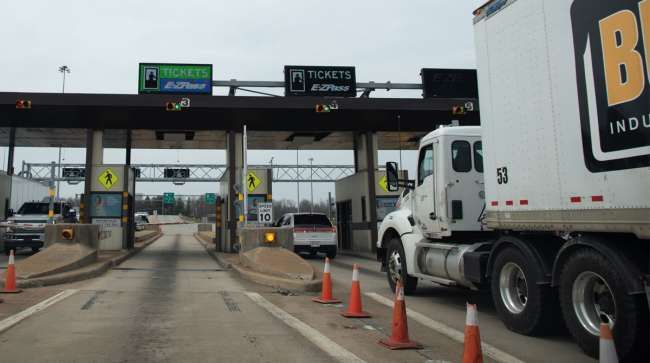How a Toll Management System Can Reduce Violations

Navigating toll payments across different states and regions is a significant challenge for commercial fleets. The diversity of toll systems, each with its own regulations, payment methods, and fee structures, creates complexity and increases the risk of costly violations.
The Challenge of Diverse Toll Systems
Drivers and fleet operators often face multiple obstacles when managing toll payments in different jurisdictions. Key challenges include:
- Varying toll costs and payment methods – Some states use electronic tolling (e.g., E-ZPass, SunPass, or FasTrak), while others rely on toll-by-plate or cash-based systems.
- Managing multiple toll accounts and transponders – Fleets operating nationwide may need to maintain several accounts across different tolling authorities, leading to administrative inefficiencies.
- Potential for costly violations – Misreads, missed tolls, and late payments can quickly accumulate into expensive fines and penalties.
For businesses managing large fleets, the administrative burden of handling toll payments, tracking expenses, and disputing violations can be overwhelming. This not only consumes time but also results in financial inefficiencies due to unnecessary overpayments and fees.
Toll Management Systems as a Solution
Toll management systems offer a streamlined approach to handling toll payments efficiently. These solutions consolidate toll accounts into a single platform, reducing the complexity of managing multiple transponders and billing statements. The key benefits include:
- Account consolidation – Centralizing toll management under a single system simplifies the payment process and ensures all toll transactions are tracked in one place.
- Automated payments – By integrating with tolling authorities, these systems eliminate the risk of missed tolls and late fees by processing payments in real time.
- Data-driven insights – Real-time tracking and reporting provide fleet managers with valuable information on toll spending, route efficiency, and driver performance.
Real-World Success: Service Trucking Inc.
A great example of how toll management systems improve efficiency is Service Trucking Inc., a Florida-based fleet that struggled with toll violations and administrative burdens. Before implementing Bestpass, they were dealing with 30 toll violations per month, often due to transponder misreads, leading to excessive fines and duplicate transactions.
By switching to Bestpass:
- Violations dropped from 30 per month to just 1 or 2.
- Misreads were reduced by 80%, eliminating unnecessary fines.
- Automated billing and Surety Balance payments eliminated late fees and long processing times.
- Monthly reporting allowed for strategic route planning, leading to further cost savings.
For both individual travelers and fleet operators, adopting a unified toll management system like Bestpass is a game-changer in ensuring seamless and cost-effective toll payments.
The Essentials of a Toll Management System
A toll management system is designed to streamline and automate the payment process for road, bridge, and tunnel tolls. For businesses managing large fleets that operate across multiple toll regions, a comprehensive toll management solution can significantly improve efficiency, reduce unnecessary fines, and provide data-driven insights for better decision-making.
Key Features of Toll Management Systems
A robust toll management system must include the following features:
1. Automated Toll Transaction Processing
Automated toll processing ensures that:
- Payments are made instantly, reducing the risk of violations.
- Transactions are accurately recorded and reconciled.
- Drivers can focus on the road without worrying about toll payments.
2. Integration with Multiple Tolling Authorities
A toll management system must be able to work across different tolling agencies and roadways. The benefits of integration include:
- Seamless communication between the software and tolling authorities.
- The ability to handle tolls across multiple states without requiring multiple transponders or accounts.
- Consistent and accurate billing to eliminate duplicate charges and disputes.
3. Real-Time Tracking and Data Analytics
One of the most valuable aspects of a toll management system is the ability to monitor and analyze toll usage in real time. This feature allows fleet managers to:
- Gain full visibility into toll spending and usage.
- Identify cost-saving opportunities by optimizing routes.
- Detecting unusual toll charges and potential fraud.
4. Customizable Alerts and Reports
Proactive monitoring is essential to ensure smooth toll payments. The system should provide:
- Balance alerts to prevent insufficient funds leading to violations.
- Violation notifications so fleet managers can quickly address any issues.
- Detailed toll reports to track spending and analyze cost trends.
5. User-Friendly Interface
For a toll management system to be effective, it must be intuitive and easy to use. Key usability features include:
- A centralized dashboard that displays all toll transactions.
- Simple navigation and reporting tools for quick access to critical data.
- Compatibility with mobile apps for real-time toll monitoring on the go.
Legal Compliance and Avoiding Penalties in Toll Management
Ensuring that all vehicles are properly registered and integrated with tolling systems helps prevent costly violations and penalties. With multiple tolling jurisdictions, varying regulations, and evolving toll policies, staying compliant requires a proactive approach that includes accurate vehicle registration and automated system updates.
Proper registration is essential to avoid penalties associated with unregistered or misidentified vehicles. A toll management system simplifies the compliance process by ensuring that all fleet vehicles are accounted for across multiple toll jurisdictions.
Best Practices for Toll Registration Compliance:
- Maintaining up-to-date vehicle and transponder data – Outdated or incorrect transponder information can lead to misreads, resulting in violations and fines. Ensuring that all vehicles have correctly assigned transponders prevents errors.
- Regular review of toll accounts – Fleet operators must verify that all vehicle registrations are correctly linked to their toll management system, especially when adding or removing vehicles. Failure to do so can lead to unpaid tolls and penalties.
- Monitoring jurisdiction-specific regulations – Each toll authority has its own compliance requirements. Keeping track of rule changes and ensuring that the fleet meets state-by-state tolling regulations minimizes compliance risks.
Automated updates play a crucial role in reducing the risk of toll violations. By automating transponder registration, account balance monitoring, and real-time data updates, fleet operators can ensure continuous compliance without the need for manual intervention.
Benefits of Automated Toll System Updates:
- Instant transponder updates – When a vehicle is added to a fleet or a transponder needs replacement, automatic synchronization with tolling authorities ensures smooth transactions.
- Real-time account balance adjustments – Prevents toll violations due to insufficient funds by ensuring that toll accounts are always properly funded.
- Reduction in human errors – Manual data entry mistakes can lead to incorrect charges and penalties. Automating updates minimizes these risks and ensures accurate toll payments.
- Streamlined toll dispute resolution – In cases where violations do occur, automated toll systems provide accurate transaction records, making it easier to contest incorrect charges and resolve disputes efficiently.
By implementing automated compliance solutions, businesses protect themselves from legal complications and financial losses, allowing them to focus on more strategic aspects of fleet management.
Steps for Modernizing Fleet Toll Management
Before implementing a toll management system, businesses should evaluate their current processes and identify inefficiencies. The following actionable steps provide a roadmap for modernizing toll management:
1. Assess Current Toll Management Practices
- Conduct a comprehensive audit of existing toll processes to identify inefficiencies, such as duplicate transactions, excessive violations, or manual reconciliation efforts.
- Determine which tolling authorities the fleet interacts with most frequently and analyze the current cost structure associated with toll usage.
2. Evaluate Toll Management Software Solutions
- Research available toll management platforms to find one that best integrates with existing fleet management and telematics systems.
- Prioritize automation, real-time tracking, and centralized billing to ensure a more streamlined and error-free toll management experience.
3. Train Staff for Optimized Usage
- Provide comprehensive training to fleet managers and drivers on how to use the toll management system effectively.
- Establish best practices for monitoring toll transactions, responding to alerts, and addressing potential violations proactively.
4. Leverage Data Insights for Cost Savings
- Utilize detailed toll transaction reports to analyze spending patterns and identify opportunities for route optimization.
- Monitor high-cost toll roads and explore alternative routes or bypass programs to reduce overall toll expenses.
5. Maintain Up-to-Date Vehicle and Transponder Information
- Regularly update vehicle registrations and transponder assignments to prevent toll misreads and violations.
- Ensure that newly added or retired fleet vehicles are promptly reflected in the toll system to avoid compliance issues.
6. Establish a Toll Violation Management Protocol
- Implement a standardized process for reviewing and disputing toll violations efficiently.
- Assign a designated team or individual to monitor toll-related disputes and ensure timely resolution to avoid late fees and penalties.
Investing in a modern toll management system is a win-win and will ultimately strengthen a fleet’s bottom line.
Why use Bestpass For Fleet Toll Management
Streamline your fleet's toll payments and reduce administrative headaches with Bestpass. Experience the ease of consolidated toll transactions, real-time analytics, and violation management that have already transformed the operations of over 30,000 customers.
Ready to optimize your fleet's toll expenses? Contact Bestpass and take the first step towards seamless toll management now.

